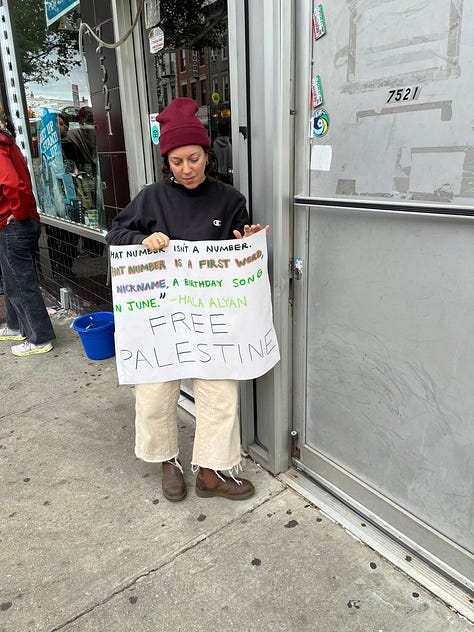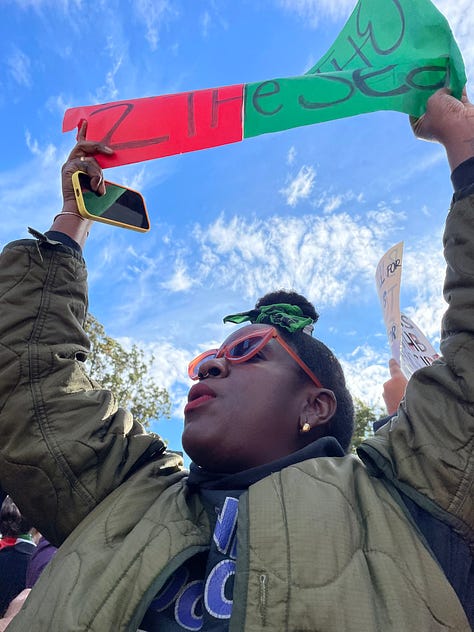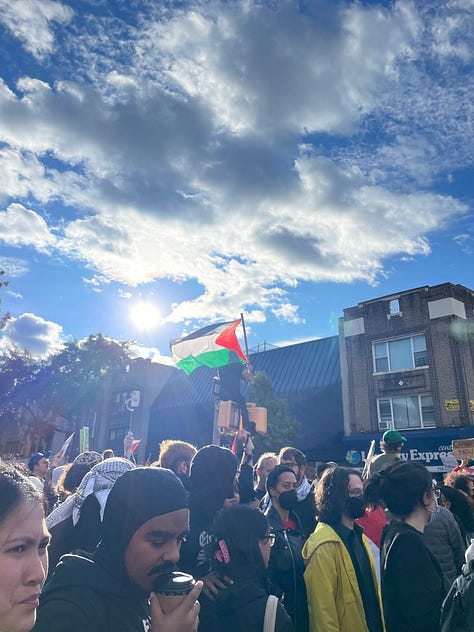Hi friend,
For those of you that have been reading Freer Form for a while now, you might have heard me talk about my meditation practice as a humbling pursuit – one that has knocked me out of idealism into practicality, out of perfection into messiness, out of being “a good person” into being a whole person.
At some point in the last 3 years of my daily practice, I started to say a prayer when the closing bell would ding on my phone. The prayer has morphed organically over time & now consists of 4 parts: my intentions, the Buddhist Death Prayer, a Metta Prayer & my closing intentions. This is what I say every day:
(Touching my head) I trust in vast intelligence. (Touching my belly) I trust in vast intuition. (Touching my heart) I trust in vast compassion.
I am of the nature to grow old. There is no way to escape growing old. I am of the nature to have ill health. There is no way to escape having ill health. I am of the nature to die. There is no way to escape death. All that I cherish & everyone I love are of the nature to change. There is no way to escape being separated from them. My actions are my only true possessions. I cannot escape the consequences of my actions. My actions are the ground on which I stand.
May the merit of this practice be of benefit & inspiration to all beings. May all beings be happy. May all beings be peaceful. May all beings be safe & protected. May all beings love & be loved. May all beings awaken to liberation…
…including this precious being, in this precious body, with this precious mind, in this precious lifetime. So be it. So it is.
This prayer comes after 20 minutes of “monkey mind” – that is, a rolodex of distractibility / impatience / boredom / lust / irritation / etc. As the sit (or lying down) ends, doubt can often creep in: why am I even doing this? This doesn’t feel like healing or growth, so why keep coming back to this practice? Sometimes I feel like all I did was sit in a mud puddle for 20 minutes. I feel soggy, damp, heavy. Wasn’t this supposed to bring me waves of peace & inner light?
My prayer is an embrace of & an answer to my doubts. By reciting it I reestablish my devotion. With every single sit I remind myself that this is a process, one of repetition, where growth happens quietly like a seed in the ground, where growth happens not linearly but in perplexing spirals.
As attractive a notion, there is no one-time-fix, no one-time-heal-it-all-meditation. Each time I sit, I am required to reestablish my intention just as I would in daily life, say, with the dishes. The way to use dishes is to take them out of the cupboard, put food on them, get them dirty, wash them, dry them, put them away, & start the process all over again when it is time for another meal. That’s just how it works. An intention is like a dish: it requires use & engagement for it to be useful.

As Palestine goes into its third week of bombardment, I have witnessed some of the most horrific images of my lifetime: dead Palestinian child after dead Palestinian child after dead Palestinian child, Palestinians attempting to uncover family members buried in rubble, armed Israeli settler vigilantes murderously capitalizing on the chaos – & on top of it all, the dehumanizing propaganda of mainstream news coverage, which seeks to reiterate that Israel is the only country with real citizens. “Dehumanizing propaganda” is not an opinion I hold, it’s a reality playing out before our eyes; Israel’s highest officials have gone on record calling Palestinians “human animals.” Prime Minister Netanyahu quickly deleted his tweet which read that the current war on Gaza is a “struggle between the children of light and the children of darkness, between humanity and the law of the jungle.” The images, stories, & voices out of Palestine show us Israel’s stated agenda clearly. Raz Segal, associate professor of Holocaust and genocide studies at Stockton University, states “Indeed, Israel’s genocidal assault on Gaza is quite explicit, open, and unashamed.” So where is the confusion? This racism, cultural cleansing, & what scholars & historians are calling “a textbook case of genocide”1 did not begin on October 7th. The question is: when will it end? & What part are we each playing in demanding it end?
As an immigrant from Israel & a child of war, I wrote this about my vantage point. Specifically, it is about my early indoctrination into Zionism, the muzzle over any questions or dissent, & the dire implications of that upbringing in this critical moment. Situated as an Israeli-American Jew, I feel a chill in my bones & a hole in my chest, knowing that the Israeli & American government are wielding Judaism as a means to justify genocide & that mainstream media voraciously supports this angle, stifling contradicting voices & evidence.
Witnessing the incredible protests & actions of the Free Palestine movement has been powerful & heartening. Yet, watching mainstream media & so many people online seek to justify what is currently happening to Palestine aches me. I witness friends or family not know what to say or do – & so, back away slowly. In being afraid to take action, to name genocide as such, they fall into neutrality, disassociation, or overthinking the (so-called) “complexity” of the issue.
My role is not to convince anyone of anything, I can only point toward information, I can only use my voice & resources to try & support those most in need, most in danger. My role is to deal with my own anger, disappointment, helplessness, shame, as all of these feelings unfold & fluctuate moment by moment, day by day.
My responsibility is to listen to my prayer as I say it. To not let it become stagnant, a husk.
To be aware that prayer is a living, flexible, & potent intention.
While governments demonstrate a callous disregard for human life, my prayer’s fabric will be poked with holes; I will feel deflated, hopeless, at a loss. But I must remember my responsibility. I must test my prayer’s mettle, inventory my intention, & use my hands to wash the dirty dish again & again.
So when the bell dings & I begin to recite, I trust in vast intelligence, I trust in vast intuition, I trust in vast compassion, that means trusting a vastness beyond my small perspective. It means trusting a multitude of people, hands, hearts, & wisdom to educate & grow me. It’s been biologically proven: we cannot grow alone. We need each other. If you are feeling confused, or angry, or uncertain, don’t let that lock you up inside yourself. Be a human about it. Reach out. Learn. Feel. Connect.
When the bell dings & I recite My actions are my only true possessions, there is no way to escape the consequences of my actions, my actions are the ground on which I stand I emphasize that my intention is only so good as my action. It’s critical not to shy away from what can be done. Because it is obvious that the bottom line for governments is land, power, & money, I have to ask:
• What is my bottom line? What is my living legacy? How do my actions foster a gentler, more loving world? What are my ethics in practice, not conceptually?
• How am I directly contributing to the well-being of this extraordinarily vulnerable population right now? I can donate to trusted organizations.
• What is the smallest, simplest action I can take right now? I can call congress.
• When I feel helpless & like checking out, how can I look at what I do have? I can share & support the work of Palestinian civilians, writers & reporters, & their allies2. I can amplify their message & fight mainstream media’s very real propaganda & shutting down of Palestinian voices - from social media censorship to the targeted murder of journalists. I can stay knowledgable about events where I live.
In this lifetime, our actions are our only true possessions. There is no way to escape the consequences of our actions. Our actions are the ground on which we stand.



My sign (above) quotes Palestinian-American writer, poet, & clinical psychologist Hala Alyan’s poem Naturalized published by Jewish Currents:
“That number isn’t a number. That number is a first word, a nickname, a birthday song in June.”
In her recent New York Times article, she writes, “The task of the Palestinian is to be palatable or to be condemned. The task of the Palestinian, we’ve seen in the past two weeks, is to audition for empathy and compassion. To prove that we deserve it. To earn it.”3 I implore you to read the article in full.

Reader, I believe that when we are together like this, tucked inside language & learning – yes, even in a digital space – I believe we hold great power, great possibility. Consider that just this morning, Israel cut all communications & internet in Gaza. What were you doing this morning? I was making breakfast, running the tap water, cleaning a dish. I was texting a friend, turning on the stove, answering an email. Where are you, right now? What’s at your disposal? Don’t throw up your hands. Use them.
With ample maple syrup,








I trust in vast intelligence, I trust in vast intuition, I trust in vast compassion. 🤲🏽
Thank you, Shira.